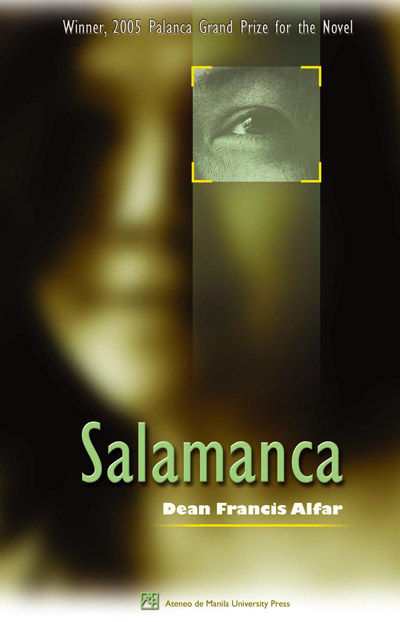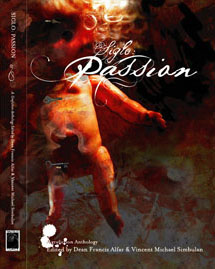Terminós
by
Dean Francis Alfar
Mr. Henares thinks
about time
From the moment he opened his eyes in the morning to the instant
before he fell asleep alone at night, Mr. Henares thought only
about time.
He reflected about how time slowed down when he was engaged in
an unpleasant activity, such as dyeing his thinning grey hair
over the broken antique basin installed by his son-in-law Alvaro
in his blue-tiled bathroom; and how time went faster during the
rare instances when he felt happy, such as when his brace of
grandchildren came for the cold weather holidays, their hypnotic
music invariably loud and invigorating.
Mr. Henares recalled days when time did not move at all: waking
up one morning convinced that it was the exact same day as the
day before, watching the red display of his tableside clock
blinking fruitlessly. The experience of the twin miércoles was
to be repeated thrice more, adding jueves, viernes and sábado to
his list of repeating days. He endured the repeated
conversations and graceless routines, read the same stories in
the newspapers and watched the same interviews on television.
Once, when he was a much younger man, Mr. Henares went back in
time. The incident caught him completely unaware – he realized
he was walking backwards and thinking thoughts in reverse. This
unfortunate event flustered him so much that when it was
suddenly over, he broke down in tears and resolved never to
travel back in time if he could help it.
One morning Mr. Henares thought about the future, methodically
spooning sweetsop into his mouth and spitting out the seeds into
a cup. He sat at the breakfast alcove of his house that
adjoined his little shop and squinted at the sun outside the
windows.
“The future is always happening,” he said to the empty kitchen.
“If it is always happening, then it is, in fact, the present;
and any instances of the future having occurred are, in fact,
the past. “
Mr. Henares stood up, wiped sweetsop juice from his chin, washed
his hands, crossed the connecting corridor and went about
opening his shop for the day.
Mr. Henares makes some sales
His first visitors were a trio of young men, all sporting nose
rings and dressed in last year’s affectation of jeans and tulle.
“Vueño arao, Mr. Henares,” the thinnest one said, removing his
Pepsi-blue hat as he entered the shop.
“Good morning,” Mr. Henares replied. “What can I do for you
gentlemen?”
“We would like to sell,” the stoutest one replied, wiping beads
of perspiration from his forehead with a swipe of a ruffled
sleeve. “We’ve been waiting for you to open.”
“Ah,” the old merchant said, “And what do you have for me?”
“We have time to kill,” the tallest one told him, offering his
hands, palms up. He looked at Mr. Henares with half-lidded
eyes.
Mr. Henares shook his head. “You understand, of course, that
rates have really gone down. With the new teatros and
entretenimientos, people are finding things to occupy themselves
with.”
“Certainly, Mr. Henares,” the stoutest one replied. “We will
take what you will offer. You are the fairest merchant in all
of Ciudad Manila.”
Mr. Henares brought out his tools, brass and glass and wood, and
extracted the precise amount of time each young man wanted to
sell. They waited patiently as he labeled each vial, heads
tilted to the mellow bossa nova tracks that emanated from a pair
of speakers from behind the counter. When he had finished
putting everything away, he gave them their payment, wrapped in
blue encaje.
The three young men opened the package then and there, much to
the discomfort of Mr. Henares. The tallest one took out the
Planet Hollywood shot glass and read aloud what was written
around the logo, as his two companions unabashedly held hands
and closed their eyes.
Silence is foolish if we are wise, but wise if we are foolish
By early evening, Mr. Henares had completed four more
transactions.
A young mother, fresh from the provinces, who sold all her
memories of childhood: Mr. Henares’s payment was etched on a
Flores bandalore, the inscription set deep in the yo-yo’s
polished wooden rim.
A drop hollows out a stone
A pair of lovers, who entered his store and left it
hand-in-hand, traded in five separate occasions of romance: when
they first knew they were in love, when they first kissed, when
they first made love, when they first reconciled, and when they
decided to stay together for as long as they could, despite all
inconvenience, difficulty or portent. Mr. Henares gave them, in
exchange, words written on yellowed Badtz Maru stationery, sweat
and ink staining the image of the little black Japanese penguin.
Night follows day
A bored widow was next, bartering away two years of future
solitude. “I’m certain someone will want that,” she said wryly,
“I certainly don’t.” Mr. Henares gave her a polished citrine
carved into the form of a tiny fluted flower with even smaller
engraved words.
We do not care of what we have, but we cry when it is lost
The widow sniffed, “True, true,” and asked if she could purchase
some romance. Mr. Henares offered her the vials he obtained
from the lovers earlier. She took two and stepped out into the
humidity.
The fourth customer was a proud-looking soldier, the buttons on
his dress uniform shiny and golden. “My maternal grandaunt told
me that I would lose my right arm in war across the sea. If it
must be so, then I’d like to sell the time of actual loss and
recovery.”
Mr.Henares studied the man’s resigned face and offered him, in
exchange for his future pain, words woven in sawali.
An empty barrel makes the greatest sound
Mr. Henares prepares for bed
As he closed the shop, he reflected on how time’s ebb and flow
meant different things to different people. He once had a
customer, a dark-skinned young man from Cabarroquis, who
protested against his good fortune in the game of love.
“Everyone I meet wants me,” the dark-eyed man sighed in Mr.
Henares’ bed. “Everyone wants to devour me. I never have time
for myself. I am certain that even you will soon speak to me of
love.”
Mr. Henares had not really been listening to him then, but was
instead enraptured by the young man’s skin, marveling at the
game of hide-and-seek the candlelight and shadows played upon
it. It was only much later when he remembered the words the man
spoke.
As he prepared his frugal dinner of salted fish and boiled
aubergine, Mr. Henares thought about how some people believed in
time as a panacea for all hurt, all pain, all woes.
A pair of sisters, veiled and somber, once asked him if he had
thirty years of uninterrupted time for sale. He sadly told them
he did not, that no one had ever sold him a block of personal
time greater than a handful of years. But inwardly, he cringed
at the notion that there were people who believed in a blessed
future, guaranteed happiness by imbibing his vials or selling
their sorrow, whether past or yet-to-come.
He felt too old to believe in what he sold.
Before going to bed in the house that adjoined his shop, Mr.
Henares checked on his trading stock, arranging various items
containing words, phrases and maxims. Behind a shelf, almost
hidden from his eyesight, he found a faded adarna plume etched
with
Vision is the art of seeing things invisible
and a handkerchief embroidered with
What we see depends on what we look for
That night, as he stripped his clothes and slipped into bed, Mr.
Henares thought about how time, whether bought or sold or
unsold, robbed everyone of everything in the end. He chuckled at
himself, surprised by his cynical perspective, scratched at a
sore spot on his spotted arms, and went to sleep, thinking about
time.
Miguel Lopez Vicente’s drought
Three days later, on the eve of his thirty-second natal day, the
storyteller Miguel Lopez Vicente came to terms with the fact
that he had nothing more to write. His body of work, unmatched
in terms of scope and volume, was testament to his genius, read,
devoured and performed in various venues all over Hinirang. In
years past, he tilled the soil of his homeland and harvested the
loves and hopes of its people, transmuting their mundane lives
into great dramas of passion. He listened to the tales of
sailors, merchants and ambassadors to foreign lands and improved
upon what he heard, spinning marvels from the barest
descriptions and epics from whispered rumors. But with each
year that passed, his ideas dwindled and dimished, leaving a
profound void in the center of his heart. He found himself
staring at virgin pages, his quill sapped by the ennui of
waiting.
“There is nothing left,” he said to his reflection in the
mirror. “I don’t want to grow old.”
He recalled the first time he knew he would be a writer, how the
sight of farmers during rice-planting season triggered a sudden
rapture in him. He remembered how the almost unbearable torrent
of words rose up his body: inarticulate syllables swiftly
welling up from the soles of his feet, combining into nouns at
his knees, verbs at his loins, adjectives and adverbs by the
time they reached his heart, joined by prepositions and articles
from his hands and arms, becoming phrases, clauses then whole
sentences when they reached his head, threatening to erupt not
only from his lips but also seeking immediate egress from his
eyes, ears and nose, before finally causing his hair to writhe
as whole paragraphs, chapters, short stories, novellas, plays
and novels recoiled backwards, suffusing his entire being with
the terrible power of expression.
The matter of age and the ravages of time had been weighing
heavily on his head for the past few months. When he passed the
halfway mark of a healthy man’s lifespan the year prior, he did
it in a wine-induced stupor, drinking in an effort to obliterate
the fact that he had written only one wondrous play the previous
year.
This year, he thought about doing something else, to ward off
the thoughts of another year ending, a fruitless year of utter
desolation - perhaps by losing himself in the arms of some
unknown young man, but decided against it. A young man’s embrace
would repeat a story he already knew (no doubt the boy’s arms
would be strong; his skin perfect and tight; his eyes round; his
life exactly the same as every other young man that Miguel had
known), a futile exercise. And so Miguel simply resolved to
determine his own story’s ending.
Miguel Lopez Vicente selects an ending
The afternoon of the next day, Miguel walked to the Encanto lu
Caminata to the shop of Mr. Henares. The shop was empty of
people when he arrived, but filled to the rafters with all
manner of jars, pots and woven baskets; vials, censers and tsino
incense stick holders; beads, feathers, and boxes and bowls of
various sizes, shapes and colors. A peculiar scent permeated
the room, swirling slowly around a large storm lantern on the
counter – the mingled smells of an eclipse, stolen kisses, and
newly-opened luggage fresh from an airplane’s belly.
Miguel was about to touch the lantern when he decided instead to
ring the tiny porcelain bell whose intricate details seemed to
never end.
“Vueño arao, what can I do for you?” Mr. Henares said, appearing
from an adjoining room.
“Good morning, Mr. Henares,” Miguel Lopez Vicente replied. “I
have come to trade away all my days.”
“All your days? Are you certain?” The old merchant looked him
straight in the eye and for a moment Miguel felt himself
dissolve into sad and heavy motes that just barely kept the
shape of a man.
“Yes,” Miguel nodded. “Believe me, this decision was not at all
spontaneous.”
“I cannot buy them all,” Mr. Henares said. “This is not that
kind of place.”
“Do you know who I am?” Miguel asked him.
“It makes no difference, sir,” Mr. Henares replied. “But, yes.
I do.”
“This way, at least, let someone benefit,” Miguel told him with
an unflinching gaze.
“I see,” said Mr. Henares. He leaned forward until the space
between him and Miguel was no wider than a fist. “But I have
nothing in stock to give you for what you want give me. It is
quite early in the month. The value of your-“
“Sir,” Miguel interrupted him, taking a step back. “Just give
me the first thing you see and we’ll call it an exchange fair
and well-made.”
“Very well,” the old man said, before vanishing into the other
room. He returned a moment later with his tools, brass and
glass and wood, and took precisely the amount of time Miguel
Lopez Vicente wanted to exchange. Afterwards, he handed Miguel
a silver thimble, discolored and slightly dented.
“This was found in a ship sleeping at the bottom of the sea, off
the island of Siqui’jor. The vessel sank fleeing pirates – it
is a story old but true.” Mr. Henares said in a soft tone.
“Sometimes, one cannot run away.”
“I am aware of that story,” Miguel sighed as he looked closely
at the thimble for the inscription.
“Of course. Of course, you are,” Mr. Henares nodded, scratching
at a sore on his left arm. He left Miguel alone to read.
Around the rim of the thimble, almost worn away, were the words
There is a reason why past is past.
That night at his home, Miguel Lopez Vicente dismissed his
maidservant early, mixed water with his last supper’s vino, a
simple claret from the vineyards of Sevilla in Ispancio,
undressed himself, taking care to empty his bowels beforehand to
maintain a semblance of dignity for the benefit of those who
would find him, and stretched out on his lonely bed built for
two.
His final thoughts, as he slipped into a dreamless sleep, were
how he wished he was a man half his age again, at the height of
his powers. That bittersweet conceit kept him occupied as cold
seawater rushed to submerge his bed.
And so his story ended.
-terminó-
“Cumpleaños felices,” the dark-skinned Katao boy from
Cabarroquis whispered, his eyes soft and liquid brown. “I am
your birthday present.”
Miguel Lopez Vicente fought his almost overwhelming excitement
and sought his voice. “You – you are?”
“Yes,” the boy smiled, trailing a slender finger down his bare
chest, stopping short at a point past his hairless navel. “Your
uncle engaged me for tonight. For you.”
“Oh,” Miguel managed, “I see.”
“Do you like what you see?”
Whatever words Miguel had suddenly dried on his tongue as he
watched the boy disrobe.
“There is no need to feel anxious.”
“No, no, I am – not anxious.”
“You only turn sixteen once. It should be special. It will be
special.” The boy had crossed the distance between them in the
span of a thunderous heartbeat and Miguel shuddered when he felt
the intense heat the boy seemed to radiate. He did not know if
it was the result of his imagination or barely controlled desire
but he feared that he would burn.
“You cannot possibly be older than me,” Miguel said, casting his
gaze to the side, suddenly conscious of the boy’s nearness.
“I am fifteen. Or thirteen. Unless you prefer me to be older,”
the boy spoke as he began unbuttoning Miguel’s shirt. “I can be
eighteen. Or twenty. Just let me know.”
“I-“ Miguel began, but as the boy’s fingers found his skin he
lost all words, the language abandoning him to the trails of
heat left by the boy’s explorations. When their tongues met, he
was certain he would be consumed by fire, losing himself in the
intense moment of unadulterated sunlight that reduced everything
that he was into a throbbing cinder, wanting only the explosive
release that was as inevitable as life and death.
“Never leave me,” he told the boy.
“Everyone loves me,” the boy answered. “You must live only for
the moment.”
“Then I’ll never be old.”
Later, after his birthday gift had left, he lay trembling in a
bed built for one, his body weak with the demarcation of new
frontiers, while his soul, not quite anywhere, exulted in the
epiphany that he was his own boundary and that it was as wide or
as narrow as he wanted.
What Miguel Lopez Vicente did not know, what he could not know,
was that his heart was ill-suited for single night’s passion.
It was fragile and tender and rare, wanting only true love, and
collapsed upon itself, heavy with imagined loss in the small
hours before dawn, feeling lost, betrayed and old before its
time.
And so his story ended.
-terminó-
When Miguel Lopez Vicente turned eight, his father brought him
to see the End of the World.
The spectacle, held only once every generation and lasting for
fourteen nights, was staged on a massive series of sculpted sets
within the Baluarte of the Plaza Miranda. Ciudad Manila spared
no expense – the costumed cast numbered in the hundreds and
great machines, made invisible by cloth and convention, spew
fire, blew wind and rained artificial hailstones the size of
macopas but with the consistency of cotton. The Beast of the
Apocalypse (a magnificent contraption maneuvered by three
alternating shifts of eighteen people) towered over the amazed
audience, clawing its way out of a bottomless pit; its words and
imprecations resounded with the voice of the Most Excellent
Primo Orador herself.
Much of the performance went over Miguel Lopez Vicente’s head;
instead he was terrified by the sights and sounds of the
Apocalypse, much to his father’s regret.
“Did you not enjoy the show?” Antonio Manuel Vicente asked him
afterwards, visibly irritated at his son’s obvious pallor.
“Yes, Papa,” Miguel lied with little difficulty.
“It is important that you know about things like this,” Antonio
continued, not hearing him. “The world ends in horror if the
will of the Three Sisters is not followed.”
“Yes, Papa.”
“That is why you must pray every day, every night, before you
eat, before you sleep. Pray for their mercy.”
“Yes, Papa.”
“When you grow older, you’ll understand that we are all servants
of the Three.”
“Yes, Papa,” Miguel replied, but in his heart he had decided
never to grow old.
When they returned home, Miguel rushed to his room and trembled
in a corner, his thoughts ablaze with images of endings and
destruction. He cried for over an hour, caught off-guard by the
tears his fear provoked, feeling helpless, alone and destined to
die in the Apocalypse that could occur tomorrow or the day after
that.
The young boy turned his back on the faith of his father that
day, with the fierce determination of the very young, and
resolved that he would rather die than live to see the End of
the World.
Before he went to sleep, he deliberately did not say his bedtime
prayers and turned the statue of the Three Sisters away from his
bed. He did not want them watching him.
The Apocalypse arrived that night, triggered by the loss of one
little boy’s faith. In their fury, radiant devas came to
Miguel’s room on shimmering wings, shattering the walls of the
house.
“So this is the one who brought about the End of Things,” the
fiercest among them said, pointing to the sleeping boy with a
sword that burned with a flame unseen since the Beginning of All
Things. With a soundless cry she struck down the remnants of
the house then flew with her legion into the sky that wept
stars.
And so his story ended.
-terminó-
Miguel Lopez Vicente’s mother, dead just a week, came to him on
the eve of his fourth birthday, saying something her son could
not quite hear.
He sat up, straining to listen to her words, having no fear of
the woman who had shown him only love.
“Miguel.”
“Mama?”
“I am lonely here. Will you come with me?”
“Yes, Mama.”
When his mother kissed him on the forehead, Miguel felt suddenly
cold and embraced her, his heavy heart, lately engorged by
sorrow, shrinking to the size of a child’s perfect love.
“You are the only one I have ever loved, my Miguel,” she told
him as they stepped into the shadows.
“Yes, Mama.”
“You will always be my little boy.”
“Yes, Mama.”
“Do not forget to take your smile with you.”
Miguel set his face into a smile of unconditional trust and
walked forward.
And so his story ended.
-terminó-
Antonio Manuel Vicente, the rising dramatist, stood at the
balcony of his tower residence and contemplated his life, like
pages in a chapbook he felt he had only partially authored.
A soft wind, heavy with the suggestion of salt, blew in from the
nearby harbor, carrying muted voices that sang, argued, lied or
whispered promises. He pulled his dressing robe closer to his
body, thinking about the sad and strange paths his life had
taken, the people he had loved and left behind, and how the
simplicity of a change of perspective –the height of a balcony –
could provoke thoughts of drastic action.
In his arms he carried his sleeping son, Miguel; a two-year-old
result of a dalliance with a woman he could honestly not
remember. He had found the boy sitting alone, silent and
stone-faced, on the stairs of his residence, with a brief letter
that held even briefer introductions. That was a week ago.
Antonio had his entire life before him and felt that the
unwelcome weight in his arms was an unfair burden. When he felt
his son stir in his arms, he summoned up all the paternal
inclinations in his heart and came up with an absolute
emptiness.
He looked at the son he had never wanted, never even dreamed of,
and without a single other thought, hurled him off the balcony.
He felt no remorse, prepared to act the distraught parent when
tomorrow brought news of the horrible accident to his ears,
already composing the lines of dialogue that he, grief-stricken,
would speak.
Miguel Lopez Vicente watched the ground rush up to welcome him
with the same stoicism he had when he was abandoned by his
mother.
And so his story ended.
-terminó-
Mr. Henares looks at his inventory
In the storeroom of his shop along the Encanto lu Caminata, Mr
.Henares looked at the eighty four vials he had distilled from
the future days of his largest customer of the year.
He gently swirled the closest one between thumb and forefinger
and watched the marvelous stories of Miguel Lopez Vicente unfold
in a glimmer of effervesce, liquid tales brimming with
potential. He paused and thought about the nature of stories,
the vagaries of time and the single, long road of desire and
shook his head, resigned to the fact that for as long as people
were people, his business would continue.
Mr. Henares replaced the vial of Miguel Lopez Vicente among the
eighty-three others, put off for the next day the task of
determining their relative prices (perhaps he would bundle two
or three – one of his regulars, a famous astronomer when he was
young, wanted some more time for stargazing), and went about
closing the shop.
“We all burn sunlight,” he muttered to no one in particular,
scratching an arm with a motion that could almost be mistaken as
a caress.
-terminó-
 Dean
Francis Alfar’s
Dean
Francis Alfar’s 

